9 Best Digital Business Cards for Modern Professionals in 2025
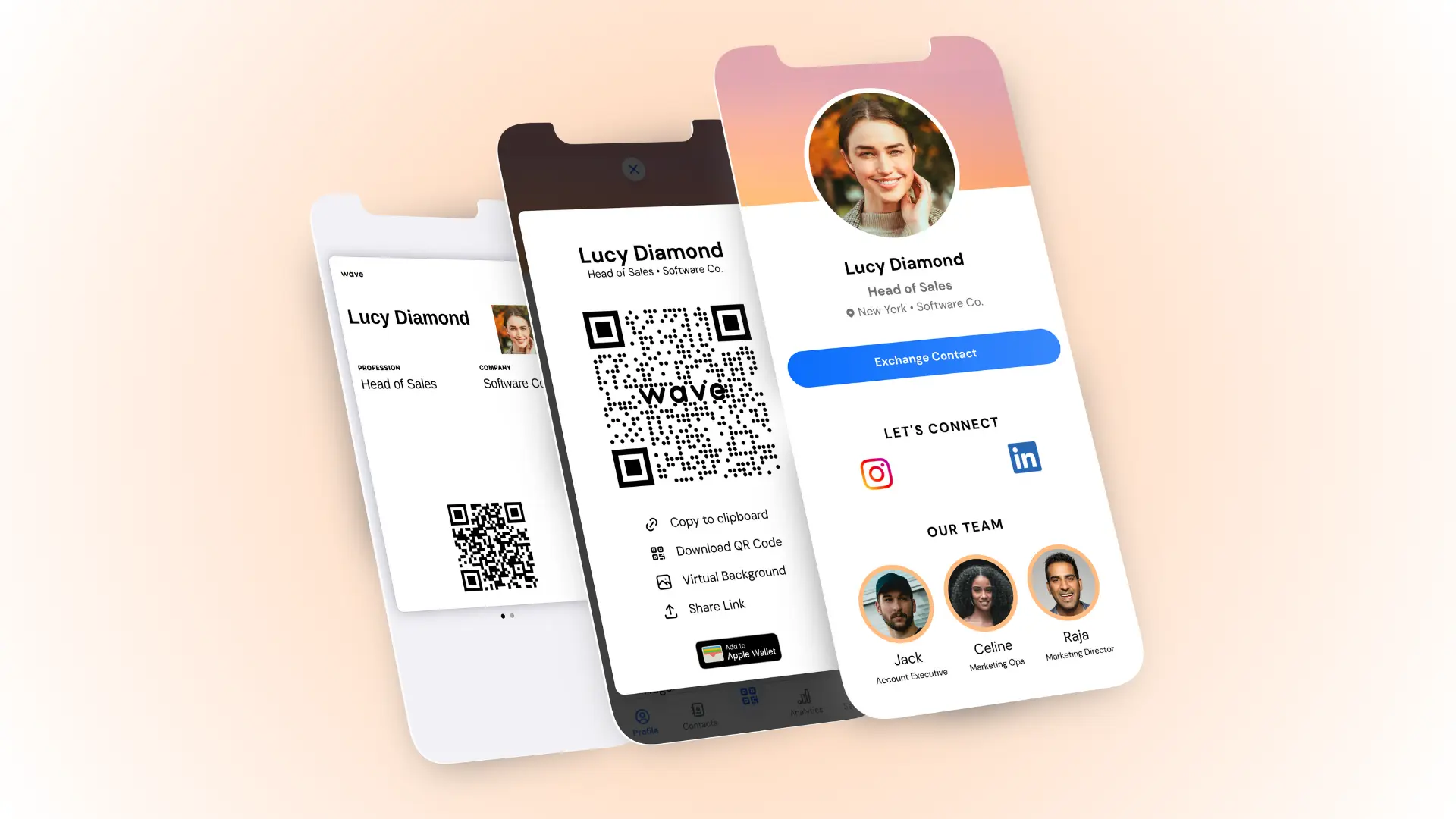
Traditional business cards are inconvenient and often ineffective. They more typically than not lead to lost or outdated contacts, and are not news to anyone. Digital business cards solve this problem, becoming the preferred networking tool for modern professionals. Major companies are already adopting them for better networking and lead management. This guide reviews the 9 best digital business cards, rated on usability, sharing options, analytics, and value, for both individuals and teams.
What Are Digital Business Cards (And Why Everyone's Making the Switch)
Think of digital business cards as your traditional business card's smarter, more capable cousin. Instead of handing someone a piece of paper, you share your contact information through a QR code, NFC tap, or simple link. The recipient gets all your details instantly with no typing, no lost cards, and no outdated information.
Here's how they work in practice: You create your digital card once on a platform, then share it through multiple methods. Your info shows up instantly when someone scans your QR code, taps their phone on your NFC card, or clicks a link you've sent. From there, it's just one tap to save everything to their contacts.
The technology isn't complicated, but the impact is significant. According to recent industry data, companies leveraging customized QR code business cards see enhanced branding, better lead generation, improved client retention, and access to valuable data-driven insights about their networking efforts.
How Digital Business Cards Work in Real-World Networking
Picture this: You're at a packed trade show booth. Instead of fumbling through your stack of paper cards while potential clients wait, you simply hold up your phone's QR code. They scan it in two seconds, your information appears on their screen, and they save it instantly. No spelling errors, no lost cards, no follow-up confusion.
The same efficiency applies to remote networking. Your email signature includes a link to your digital card. When someone clicks it, they see your full profile, contact details, social media links, portfolio samples, even a brief video introduction. It's like having a mini-website that fits in a single click.
For sales professionals, the real magic happens in the follow-up. When someone interacts with your digital card, you get analytics. You know who viewed your information, when they did it, and which parts they found most interesting. The best digital business cards turn these interactions into valuable data, helping you follow up with precision and purpose instead of guesswork.
The Shift from Paper to Pixel: Why Digital Is Dominating 2025
The numbers tell a clear story. Digital business card adoption has grown 300% since 2020, driven by three major factors: convenience, cost-effectiveness, and sustainability.
Convenience wins because QR codes and NFC technology make sharing information faster than traditional card exchanges. No more digging through wallets or asking people to spell their names. One scan or tap, and the job is done.
Cost-effectiveness matters for growing businesses. A stack of 500 traditional cards costs $50-200 and becomes worthless the moment someone changes roles or phone numbers. Digital cards update instantly and cost pennies per user annually.
Sustainability concerns are pushing corporate adoption. A single digital business card can replace thousands of paper cards over its lifetime, eliminating printing costs and reducing environmental impact. Companies report saving up to $315,000 annually per 1,000 employees by switching to digital alternatives.
The hybrid work environment accelerated this shift. When networking moved online during 2020-2021, professionals needed digital-first solutions. Even as in-person events returned, the convenience of digital sharing stuck. Today's networkers expect seamless, instant contact exchange, and digital cards deliver exactly that.
What Makes a Digital Business Card Platform Worth Your Investment
Not all digital business card platforms are created equal. After testing dozens of options, we identified five critical factors that separate the winners from the wannabes.
Core Functionality & Ease of Use comes first. The best platforms get you up and running with a professional card in under five minutes - no tech skills needed. They work smoothly on any device or system, so your contacts can access your info no matter what phone or computer they're using.
Customization & Branding Power determines whether your card looks generic or professional. Top platforms offer extensive design options, custom domains, and white-labeling capabilities. Your digital card should reinforce your brand, not advertise the platform that created it.
Sharing & Integration Capabilities make or break the user experience. The best platforms support multiple sharing methods, QR codes, NFC taps, email links, and wallet integration. They also connect with your existing tools, syncing contacts directly to your CRM and email platforms.
Analytics & Performance Tracking turn networking into measurable business activity. Quality platforms show you who's viewing your card, when they're engaging, and which information resonates most. This data helps you refine your networking approach and measure ROI.
Pricing & Value Proposition varies dramatically across platforms. The best solutions offer generous free tiers for individual users and reasonable team pricing that scales with your business. Watch out for platforms that lock basic features behind expensive paywalls.
9 Best Digital Business Cards That Actually Deliver Results
Now you know that in today's digital age having a digital business card is important. Let's see which are the 9 best digital business cards that can help you make a lasting impression and drive results.
1. Wave Connect: The Free-Friendly Powerhouse
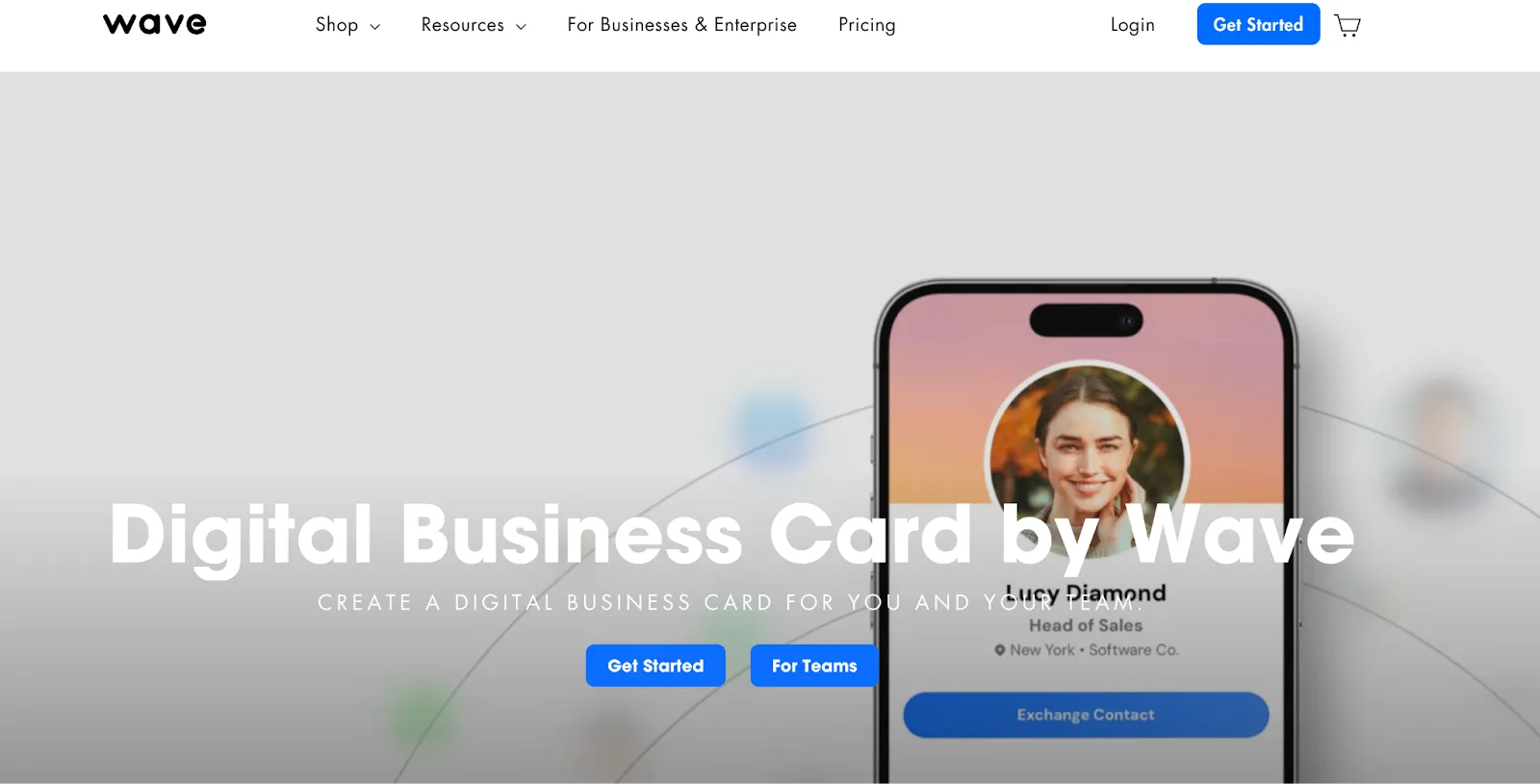
Best for: Small businesses and budget-conscious professionals who need enterprise features without enterprise prices
Wave Connect stands out for offering the most comprehensive free tier in the industry. While competitors lock basic features behind paywalls, Wave gives you professional card creation, QR and NFC sharing, and contact management at no cost. The Pro plan at $4.99/month adds analytics, CRM integrations, and video introductions, features that cost $20+ monthly elsewhere.
Key strengths: The platform excels at team management, offering admin controls and branded templates that maintain consistency across organizations. Their NFC cards work perfectly with both iPhones and Androids, and you can customize the QR codes however you want. Wave syncs with Salesforce, HubSpot, and Microsoft Dynamics, so your contacts flow right into whatever system you're already using.
Why it made our list: Wave Connect gives you big-company features without the big-company price tag. Their SOC 2 Type 2 compliance and role-based admin controls satisfy security requirements for large organizations, while their free tier makes them accessible to individual professionals. Over 100,000 users across 170+ countries trust Wave for their networking needs.
Pricing: Free plan with full functionality; Pro at $4.99/month; Teams from $5/user/year
2. ZUMVU Business Card: The Analytics-Driven Choice
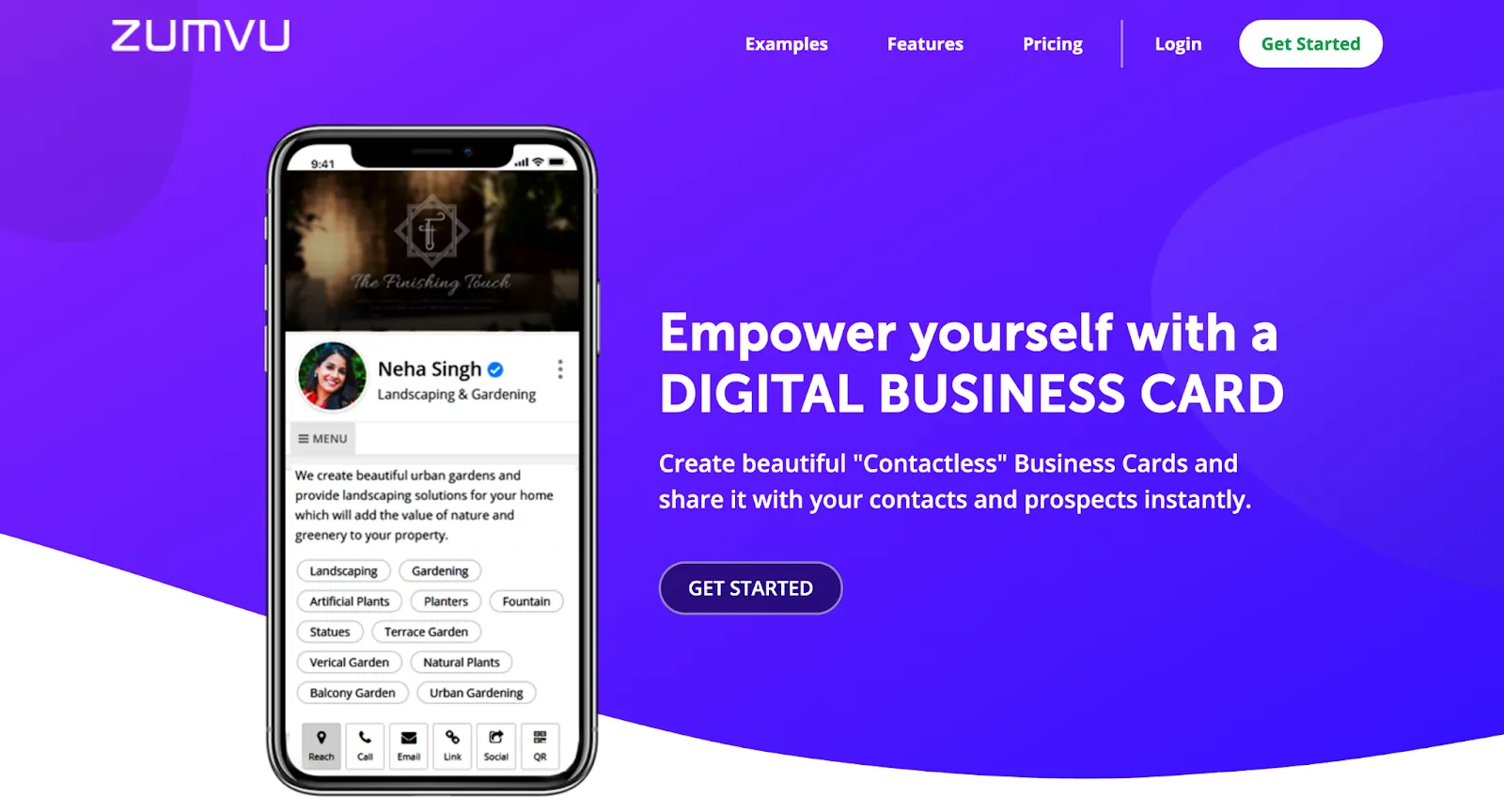
Best for: Data-driven professionals and marketing teams who need detailed engagement insights
ZUMVU's best feature is its analytics dashboard that shows exactly how people interact with your card. You'll see who looked at it, which parts they focused on, when they checked it out, and how they found you in the first place. This level of detail helps you optimize your networking strategy based on real user behavior.
Key strengths: The platform offers highly customizable templates that don't look cookie-cutter, plus lead capture forms that integrate with major email marketing platforms. Their contact management system automatically organizes new connections and can trigger follow-up sequences based on engagement patterns.
Why it made our list: ZUMVU bridges the gap between networking tools and marketing platforms. Their analytics help you understand which networking approaches work best, while their automation features ensure no leads fall through the cracks.
Pricing: Free basic plan with premium tiers starting at competitive rates
3. Covve Scan: The AI-Powered Contact Manager
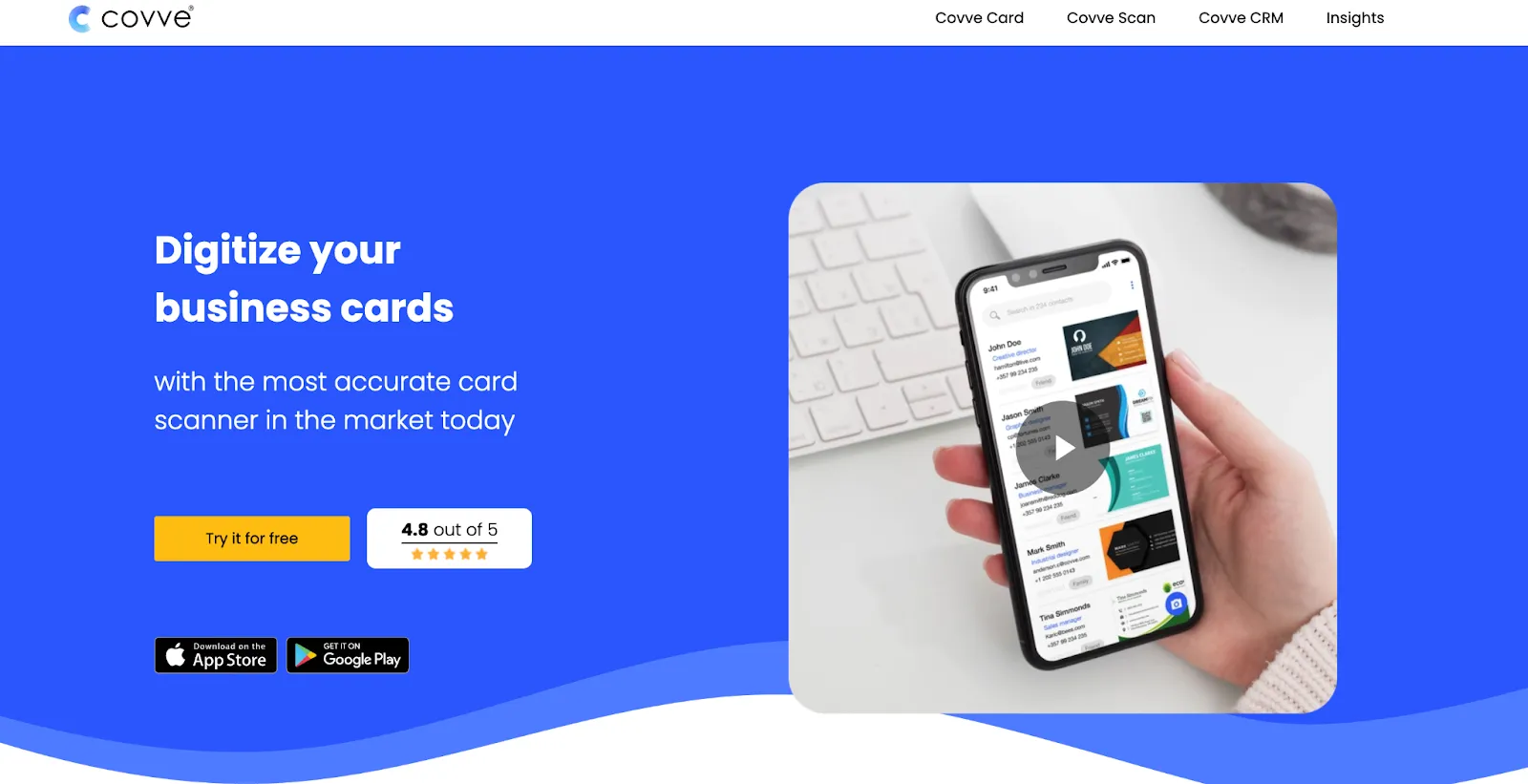
Best for: Sales professionals and heavy networkers who collect hundreds of contacts monthly
Covve Scan's AI technology automatically enriches contact information, finding social media profiles, company details, and recent news about your connections. When someone shares their digital card with you, Covve fills in the gaps with publicly available information, creating comprehensive contact profiles without manual data entry.
Key strengths: The platform excels at bridging physical and digital networking. Their business card scanning feature uses AI to extract information from traditional cards, while their contact enrichment keeps your database current with job changes and company updates. CRM sync capabilities ensure your enriched contacts flow seamlessly into your sales pipeline.
Why it made our list: Covve Scan solves the contact management problem that plagues busy networkers. Instead of maintaining scattered, incomplete contact lists, you get rich, up-to-date profiles that help you build stronger professional relationships.
Pricing: Free tier available with premium upgrades for advanced AI features
4. Kopplcard: The Lead Generation Specialist
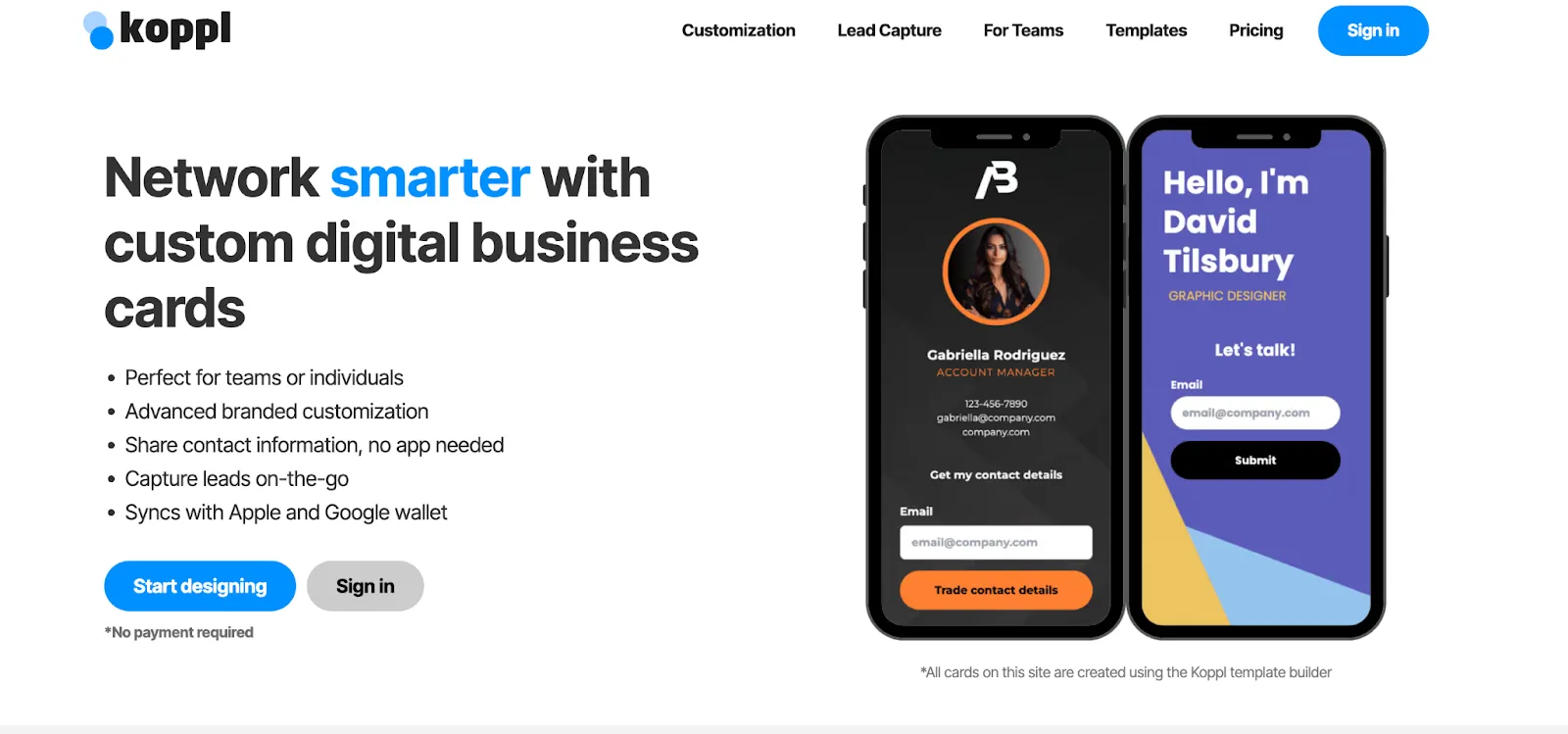
Best for: Sales teams and lead-focused businesses that prioritize conversion tracking
Kopplcard's wallet integration is what makes it different - people can save your info directly to their Apple or Google Wallet, so your details are always there even offline. You can tweak the lead forms and trigger automatic follow-ups based on how recipients interact with your card.
Key strengths: The platform's team analytics provide managers with visibility into networking performance across their organization. You can see which team members are generating the most leads, which events produce the best results, and how quickly contacts move through your sales funnel. Their wallet integration also works offline, solving connectivity issues at crowded events.
Why it made our list: Kopplcard treats networking as a measurable business process rather than just a social activity. It stands out among the best digital business cards for its laser focus on lead generation and conversion tracking, ideal for sales-driven organizations that need to justify networking ROI.
Pricing: Free basic features with premium plans for advanced analytics and team management
5. SnapADDY: The CRM Integration Champion
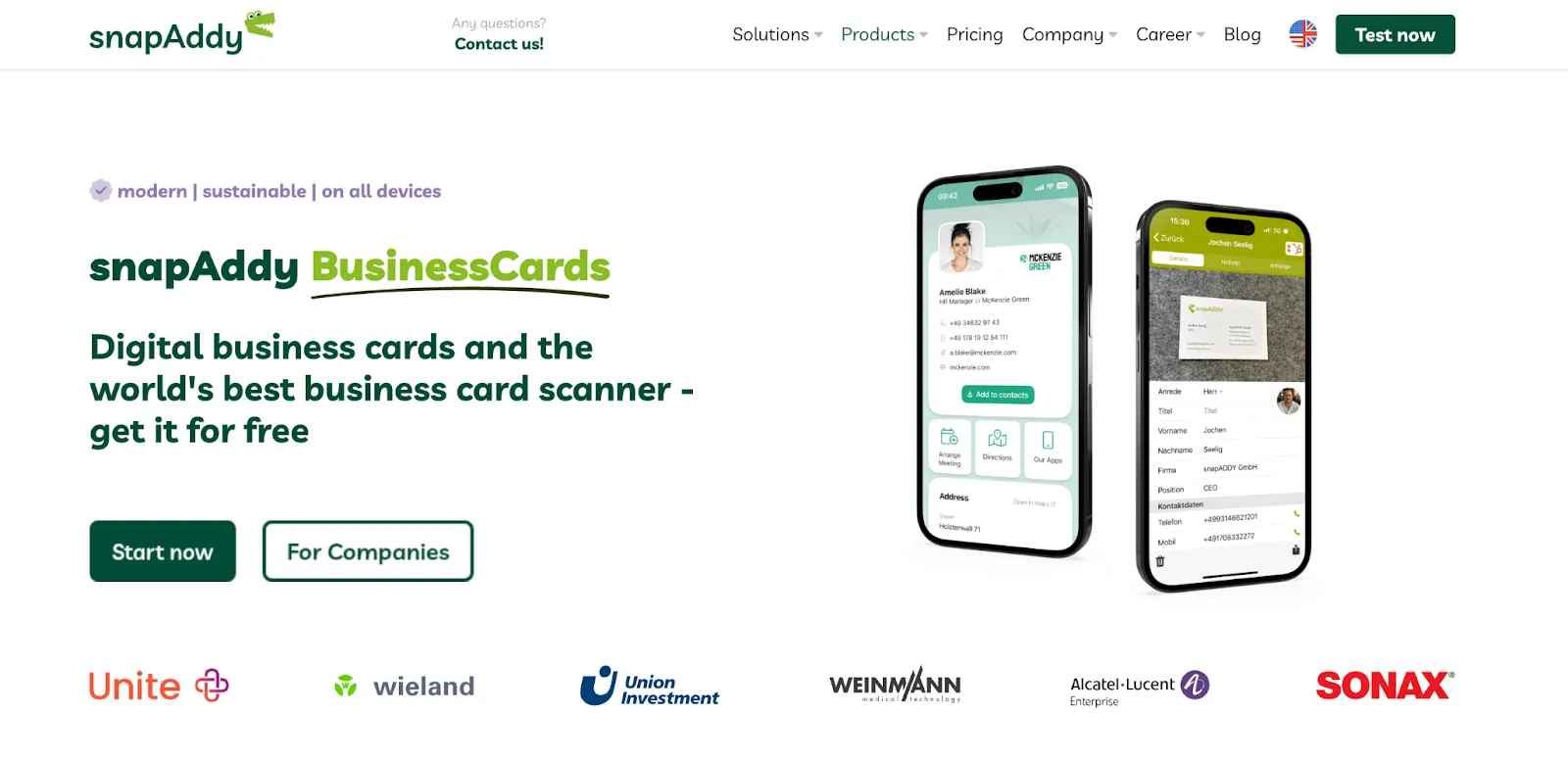
Best for: Enterprise teams with existing CRM systems who need seamless contact synchronization
SnapADDY's deep CRM integration capabilities are unmatched in the industry. The platform connects with over 20 CRM systems and can automatically create leads, contacts, and opportunities based on digital card interactions. Their business card scanning technology works with both physical cards and digital formats, ensuring no networking opportunity gets lost.
Key strengths: The platform's automated contact management eliminates manual data entry and reduces human error. When someone interacts with your digital card, their information flows directly into your CRM with proper tagging and categorization. Their duplicate detection prevents database bloat, while their data enrichment keeps contact information current.
Why it made our list: SnapADDY solves the biggest pain point in professional networking, getting contact information from networking events into your CRM system. Their automation reduces administrative overhead while improving data quality and follow-up consistency.
Pricing: Free basic plan with premium tiers for advanced CRM features and team management
6. mTap: The NFC Innovation Leader
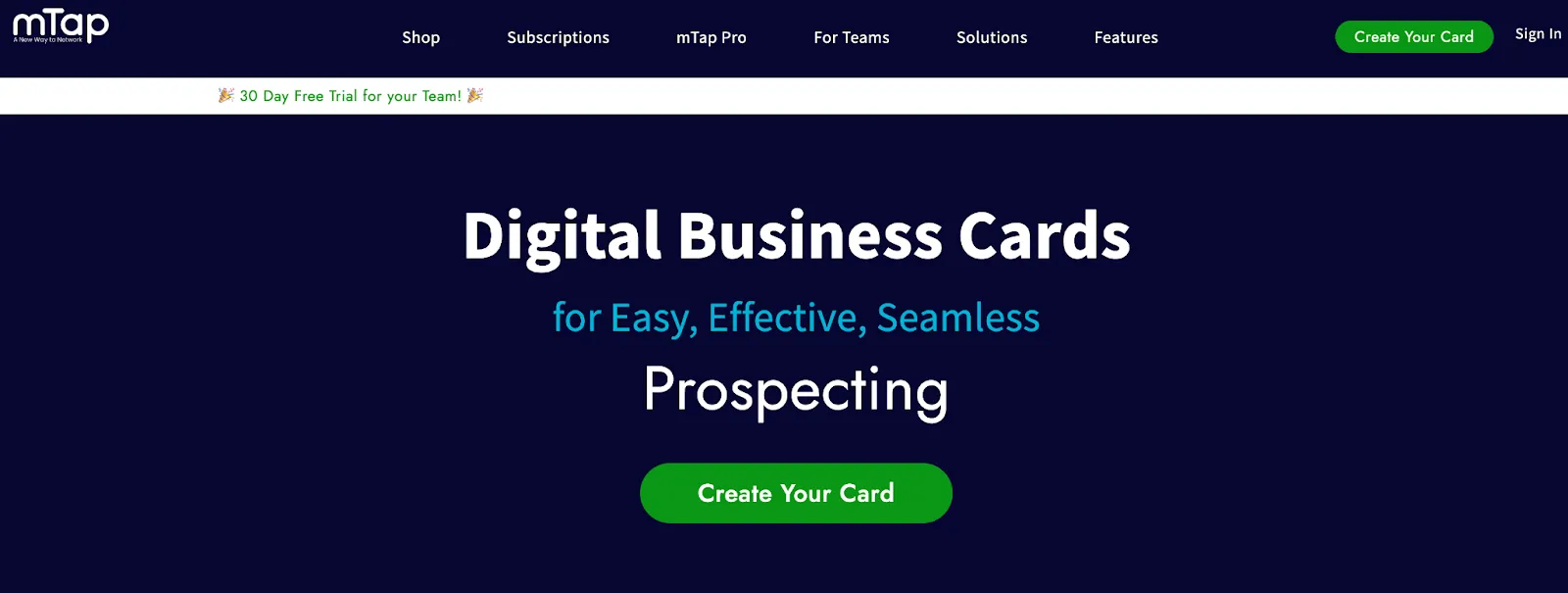
Best for: Tech-forward professionals and modern networkers who want cutting-edge sharing capabilities
mTap's NFC technology represents the future of contact sharing. Their NFC-enabled cards and accessories let you share information with a simple tap, creating an almost magical networking experience. It works with any phone that has NFC, which is basically every smartphone made in the last few years.
Key strengths: Their NFC actually works better than others. It connects faster and plays nice with more devices. Their customizable profiles support rich media content, including videos, portfolios, and social media integration. Analytics tracking shows you exactly when and where your NFC cards are being used.
Why it made our list: mTap represents the cutting edge of networking technology without sacrificing usability. Their NFC cards create memorable networking moments while providing practical benefits like instant contact sharing and engagement tracking.
Pricing: Free basic features with premium plans for advanced customization and analytics
7. wCard.io: The Template Variety Winner
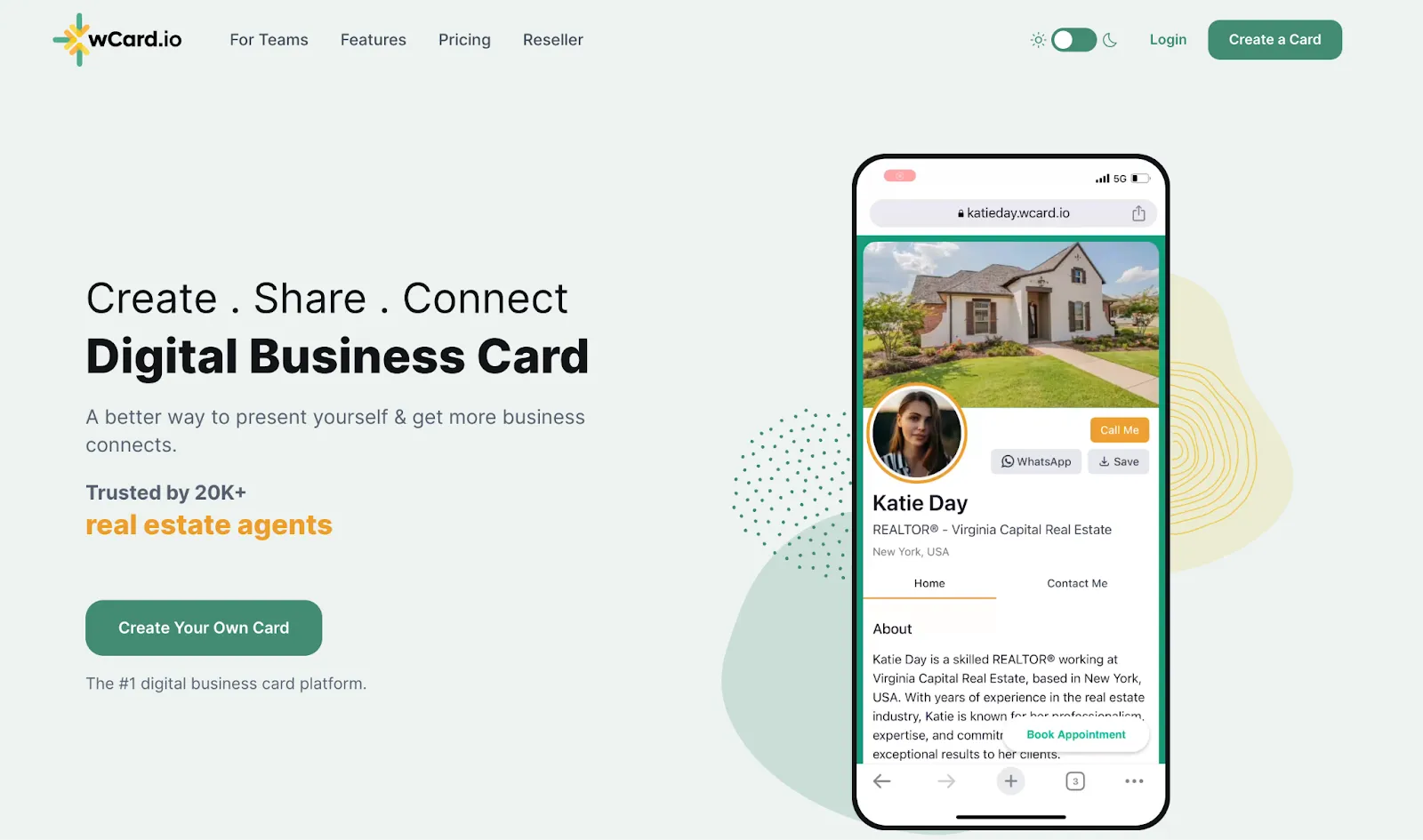
Best for: Creative professionals and design-conscious users who need visual flexibility
wCard.io offers the most extensive template library in the industry, with designs ranging from minimalist professional to creative showcase formats. Their customization options go beyond color schemes and fonts, allowing you to create truly unique digital cards that reflect your personal or company brand.
Key strengths: The platform's design flexibility doesn't compromise functionality. Their QR codes are highly customizable and can match your brand colors, while their contact management system organizes connections efficiently. Social media integration is seamless, and their analytics provide useful engagement insights.
Why it made our list: wCard.io proves that digital business cards don't have to look generic. Their design options help creative professionals showcase their aesthetic sensibilities while maintaining professional networking functionality.
Pricing: Free basic plan with premium options for advanced design features and analytics
8. Mecard: The Simplicity Champion
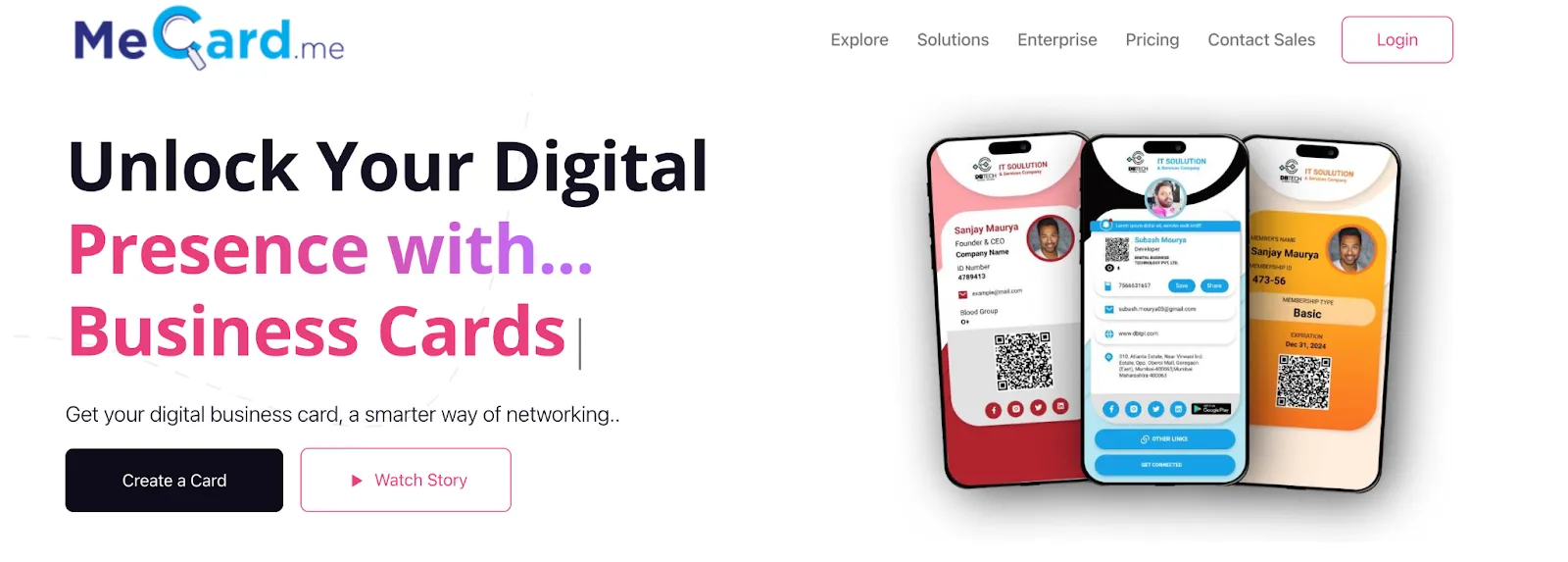
Best for: Small business owners and networkers who want effective simplicity
Mecard strips away complexity to focus on core networking functionality. Their platform prioritizes ease of use over feature abundance, making it perfect for users who want professional digital cards without learning complex systems. Setup takes minutes, and sharing is intuitive for both sender and recipient.
Key strengths: The platform's simplicity is its strength. QR code generation is instant and reliable, contact sharing works across all devices, and basic analytics provide useful insights without overwhelming detail. Their customer support is responsive, and their pricing is transparent with no hidden fees.
Why it made our list: Mecard proves that effective networking tools don't need to be complicated. Their focus on core functionality appeals to users who want reliable contact sharing without feature bloat or steep learning curves.
Pricing: Free basic features with affordable premium upgrades for additional functionality
9. VCard Plus by QRCodeChimp: The QR Code Specialist
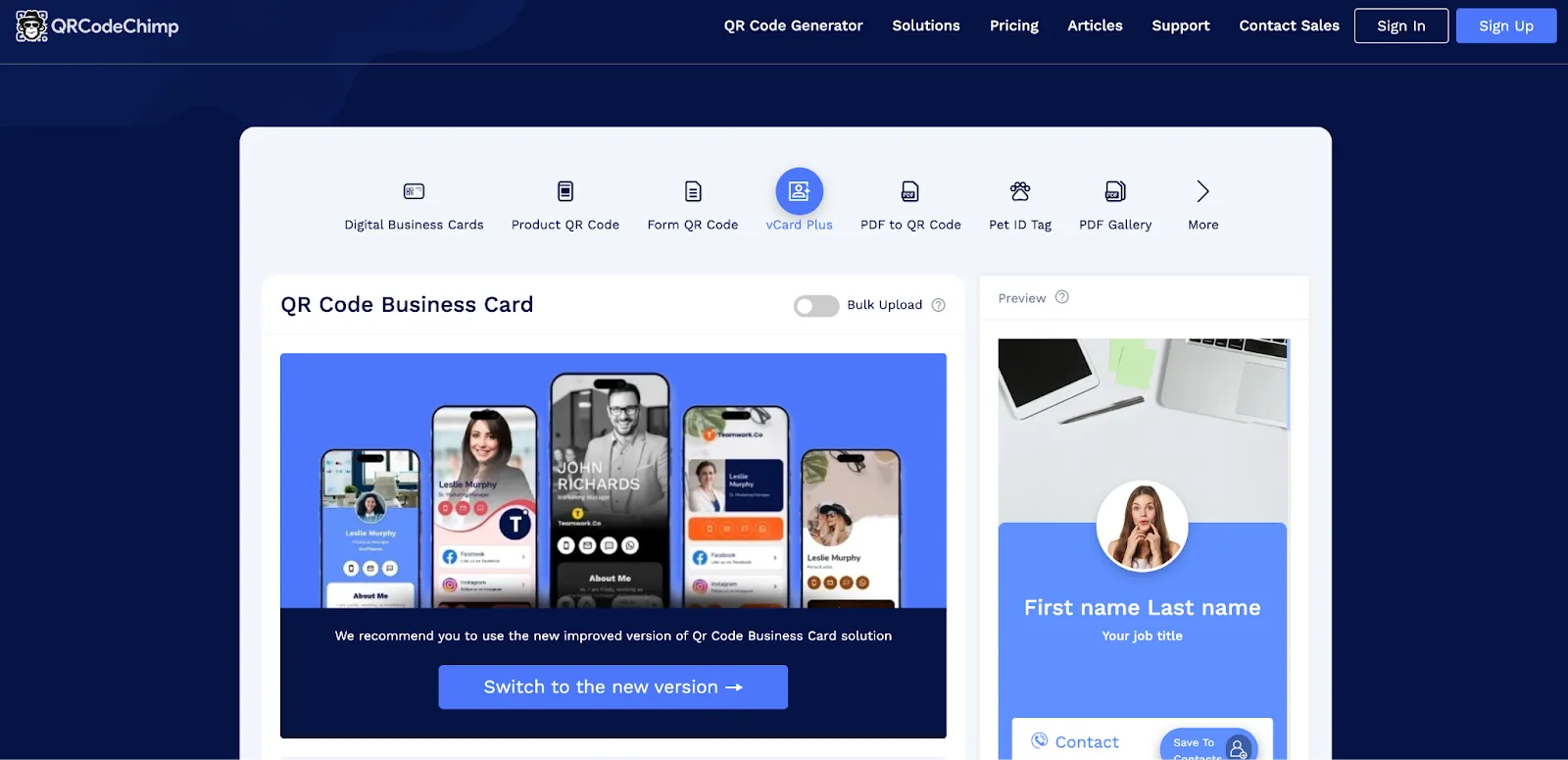
Best for: Marketing professionals and bulk card creators who need advanced QR code functionality
VCard Plus nails dynamic QR codes that you can update after making them - perfect for ongoing campaigns or when you're handing out tons of cards. Their customization options are unbeatable, so you can make codes that look exactly like your brand while still scanning reliably every time.
Key strengths: The platform's bulk creation capabilities let you generate hundreds of unique digital cards simultaneously, perfect for events or team deployments. Their analytics provide detailed insights into QR code performance, including scan locations, device types, and engagement patterns. Dynamic QR codes can be updated without reprinting, saving costs for physical marketing materials.
Why it made our list: VCard Plus excels at the technical aspects of QR code creation and management. It's one of the best digital business cards for marketers who rely on precision, branding, and measurable engagement, especially when working at scale.
Pricing: Free basic plan, Starter at $6.99/month;Pro at $13.99/month with volume discounts available
How to Choose the Perfect Digital Business Card for Your Needs
Choosing the right platform starts with understanding your primary use case. Individual networkers should prioritize ease of use and personal branding features. Team deployments require admin controls and brand consistency tools. Sales-focused users need lead capture and CRM integration capabilities. Creative professionals benefit from design flexibility and portfolio features.
Your sharing preferences also matter significantly. If you plan to use QR codes primarily, choose platforms with advanced QR customization like VCard Plus or Wave Connect. NFC enthusiasts should prioritize mTap or Wave Connect for their superior NFC capabilities. Email-focused networkers need platforms with strong email signature integration, while social media-heavy users should look for robust social link management.
Consider your technical comfort level honestly. Beginners benefit from Wave Connect or Mecard's simple setup processes. Tech-savvy users can take advantage of mTap or SnapADDY's advanced features. Design-focused professionals should explore wCard.io or ZUMVU's customization options.
Budget and scalability planning prevents expensive surprises later. Evaluate what's included in free tiers versus premium features. Compare team pricing models, some platforms charge per user while others offer flat rates. Understand feature upgrade paths so you know what premium benefits you're paying for.
Pro Tip: Test 2-3 platforms using their free tiers before committing to paid plans. Create sample cards, practice sharing methods, and gather feedback from colleagues. This hands-on experience reveals usability issues that aren't apparent from feature lists alone.
Making the Switch: Your Digital Business Card Action Plan
Start your transition with a quick audit of your current networking challenges. Are you losing paper cards? Struggling with outdated contact information? Missing follow-up opportunities? Identifying specific pain points helps you choose the right platform and measure improvement.
Test 2-3 platforms from our list using their free tiers. Create your first digital card with essential information, name, title, company, phone, email, and one social media link. Keep it simple initially; you can add complexity later.
Practice sharing methods before your next networking event. Generate your QR code and test it with colleagues. If you're using NFC cards, practice the tapping motion until it feels natural. Add your digital card link to your email signature and test it across different email clients.
Gather feedback from your initial contacts. Ask colleagues and clients about their experience receiving and saving your digital card. Their insights reveal usability issues and help you refine your approach before broader deployment.
Final Takeaways
These best digital business cards have revolutionized networking by giving us interactive, eco-friendly alternatives to traditional paper cards with features like analytics, easy sharing, and customization options. Among all options reviewed, Wave Connect stands out as the most budget-friendly solution that doesn't compromise on essential features. It's the perfect choice for professionals seeking maximum value without the premium price tag.
Frequently Asked Questions About Digital Business Cards
Are digital business cards secure and private?
Most platforms comply with GDPR and other privacy regulations, giving you control over your data. Recipients can only see information you choose to share, and you can track who's accessing your card through analytics dashboards.
What if someone doesn't have a smartphone?
Digital cards work through multiple sharing methods beyond QR codes. You can send your card via email, text message, or direct link that works on any internet-connected device. Many platforms also generate traditional contact files (vCard format) that work with older systems.
For networking events with mixed audiences, consider a hybrid approach. Carry a few traditional business cards for situations where digital sharing isn't practical, while using digital cards as your primary method.
Can I still use them without an internet connection?
QR codes and NFC cards work offline for basic contact sharing. Recipients can scan your code or tap your card without internet connectivity, though they'll need a connection to save the information to their contacts or access rich media content.
Some platforms, like Kopplcard's wallet integration, store your basic contact information directly on the recipient's device, ensuring access even without connectivity. Plan for offline scenarios by including essential contact information in formats that don't require internet access.
How do I track the effectiveness of my digital card?
Most platforms provide analytics showing view counts, click-through rates, and engagement patterns. Key metrics include total views, unique visitors, contact saves, and social media clicks. Advanced platforms like ZUMVU show which sections of your card receive the most attention.
The best digital business cards turn this data into actionable insights, helping you measure networking ROI by tracking leads generated, meetings scheduled, and deals closed from card interactions. Use this data to measure networking ROI by tracking leads generated, meetings scheduled, and deals closed from digital card interactions.
Are they accepted in traditional industries?
They are. The key is positioning digital cards as a modern efficiency tool rather than a tech novelty.
Start by using digital cards alongside traditional ones in conservative environments. As colleagues see the benefits, instant contact sharing, automatic updates, and professional appearance, resistance typically decreases. Focus on practical benefits rather than technological features when introducing digital cards to traditional audiences.